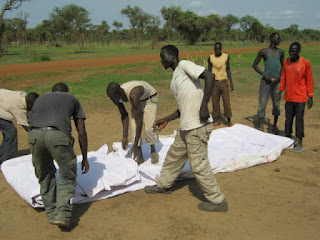Not sated by the 24/7 party lifestyle here, I've signed up for a bit more in January. I've been here for two and a half months without the Kurdish government being very bothered, but my desire to come back for another month has led to a flurry of official paperwork, cross-examination and blood-letting (HIV test). The Kurdish intelligence service demanded an interview, where peculiar questions were posed. I gave details of the full names of my mother, father and sister, so I apologise if you get arrested by a dark-skinned man with a bushy black moustache in the coming weeks. They were also interested to learn which floor of my apartment building I lived on, which is clearly of great importance to national security.
One half-day in the bowels of the intelligence building wasn't enough, and my colleague and I were summoned the next day. Turns out that another NGO operates here with a very similar name (in fact the same name with "in Kurdistan" tagged on the end), and the employees were found to be smuggling gold after a routine fact-finding government raid. Cue lots of questions of the nature "why were you smuggling gold?" Eventually the fact that we weren't dressed in fur coats and carrying ivory canes convinced them to let us go.
Elsewhere, life has carried on. We're busy ordering winter clothes to send to the chilly youngsters in the refugee camps, so job-lots of Ugg boots and Hely Hanson ski jackets or similar should be on their way there soon. On a conference call last week somebody in Baghdad gave a long account in arabic of something, so I passed the time by practising my arabic writing in my notebook. One of my colleagues noticed and said "wow, you're taking notes in arabic" so I showed him what I'd written. "Yesterday I went into town and saw a big dog and the king of Jordan" wasn't what the guy on the call was saying, but I think my linguistic skills earned me a little respect nonetheless.
Photography is not welcomed in military buildings so I don't have any shots of the intelligence officers. Instead here is a photo of a bottle of handwash that just turned up in our bathroom. Good to get some romance in the bathroom.
One half-day in the bowels of the intelligence building wasn't enough, and my colleague and I were summoned the next day. Turns out that another NGO operates here with a very similar name (in fact the same name with "in Kurdistan" tagged on the end), and the employees were found to be smuggling gold after a routine fact-finding government raid. Cue lots of questions of the nature "why were you smuggling gold?" Eventually the fact that we weren't dressed in fur coats and carrying ivory canes convinced them to let us go.
Elsewhere, life has carried on. We're busy ordering winter clothes to send to the chilly youngsters in the refugee camps, so job-lots of Ugg boots and Hely Hanson ski jackets or similar should be on their way there soon. On a conference call last week somebody in Baghdad gave a long account in arabic of something, so I passed the time by practising my arabic writing in my notebook. One of my colleagues noticed and said "wow, you're taking notes in arabic" so I showed him what I'd written. "Yesterday I went into town and saw a big dog and the king of Jordan" wasn't what the guy on the call was saying, but I think my linguistic skills earned me a little respect nonetheless.
Photography is not welcomed in military buildings so I don't have any shots of the intelligence officers. Instead here is a photo of a bottle of handwash that just turned up in our bathroom. Good to get some romance in the bathroom.

.jpg)
.jpg)
.jpg)
.jpg)
.jpg)



























